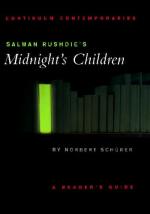|
This section contains 5,373 words (approx. 18 pages at 300 words per page) |

|
SOURCE: Cook, Rufus. “Place and Displacement in Salman Rushdie's Work.” World Literature Today 68, no. 1 (winter 1994): 23-8.
In the following essay, Cook considers the theme of cultural displacement in Rushdie's work, noting that “all of Rushdie's novels can be read as an acknowledgment that reality takes precedence over art, that ‘the unchanging twoness of things’ can never be reconciled to ‘the universe of what-happened-next.’”
Salman Rushdie is not only an “almost textbook example” of a self-reflexive postmodern novelist;1 he is also—not coincidentally—one of the most persuasive spokesmen we have for the benefits, in increased tolerance and moral understanding, of cultural displacement. Because he has been forced “to find new ways of describing himself, new ways of being human,”2 Rushdie argues, the immigrant or expatriate is in a better position than the rest of us to appreciate the pluralistic, contradictory nature of contemporary experience: to accept the fact...
|
This section contains 5,373 words (approx. 18 pages at 300 words per page) |

|


